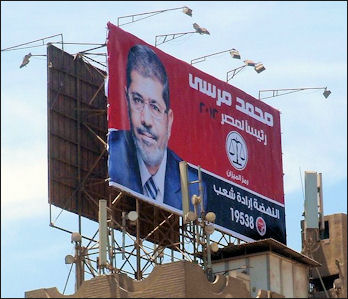Home | Category: Conservative Muslim Groups
MUSLIM BROTHERHOOD
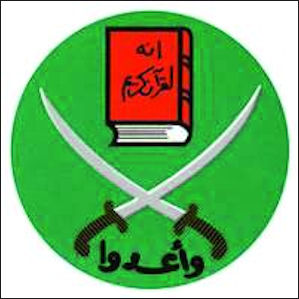
Muslim Brotherhood Emblem The Muslim Brotherhood is a powerful Islamic organization, especially in Egypt. It has been around for some time and has been a prototype and an inspiration for many modern Muslim extremist groups and fundamentalist organizations.
The Muslim Brotherhood began as an effort to improve social and individual morality and fight the British occupation. It advocated both political and spiritual reform and insisted that this be achieved by organizing life and society around the Koran. These beliefs were combined with a drive to fight oppressors, get rid of poverty and social injustice and bring Muslims back to their roots. It didn’t oppose modernism and the education or employment of women as long it didn’t conflict with Islamic doctrine and was in accordance with Islamic law. The West however was regarded as a corrupting influence.
The Muslim Brotherhood has a lot money, much of it in offshore accounts. It has its own intelligence service. The Muslim Brotherhood and other moderate Islamic groups has widespread support among doctors, lawyers, religious leaders, students and ordinary men and women. It is strongly supported financially by baazaris.
John Mintz and Douglas Farah wrote in the Washington Post : The Brotherhood -- or al-Ikhwan al-Muslimun, as it is known in Arabic -- is a sprawling and secretive society with followers in more than 70 countries. It is dedicated to creating an Islamic civilization that harks back to the caliphates of the 7th and 8th centuries, one that would segregate women from public life and scorn nonbelievers. In some nations -- Egypt, Algeria, Syria, Sudan -- the Brotherhood has fomented Islamic revolution. In the Palestinian territories, the Brotherhood created the Islamic Resistance Movement, or Hamas, which has become known for its suicide bombings of Israelis. Yet it is also a sophisticated and diverse organization that appeals to many Muslims worldwide and sometimes advocates peaceful persuasion, not violent revolt. Some of its supporters went on to help found al Qaeda, while others launched one of the largest college student groups in the United States. For decades, the Brotherhood enjoyed the support of the government of Saudi Arabia and its oil billions, which helped the group expand in the United States. [Source: Washington Post , John Mintz and Douglas Farah, September 11, 2004]
Steve Coll wrote in the The New Yorker: “The Brotherhood was initially a religious-minded movement opposed to British colonial rule in Egypt; later, following Britain’s withdrawal from the region, the Brotherhood’s leaders continued their struggle against the secular, socialist Egyptian leader Gamal Abdel Nasser, who took power in 1952. In his approach to the Brotherhood, Nasser alternated between periods of accommodation and brutal crackdowns. Some of the Brotherhood’s organizers were forced into exile, and they began to form new chapters across the Muslim world. Their aim was to replace secular and nationalist Arab leaders with Islamic governments, and they often operated clandestinely. Today, the movement typically recruits its members from élite, well-educated families; its goals include the imposition throughout Muslim societies of sharia — law as set forth in the Koran — and the empowerment of Islamic scholars as cultural arbiters and dispensers of justice...Over the years, the Brotherhood has operated both in the open and in secret, through peaceful political campaigning and through support for terrorism. [Source: Steve Coll, The New Yorker, December 12, 2005]
Websites on Muslims Divisions Divisions in Islam archive.org ; Shi’a History and Identity shiism.wcfia.harvard.edu ; What is Shi'a Islam? iis.ac.uk ; Four Sunni Schools of Thought masud.co.uk ; History of Islam: An encyclopedia of Islamic history historyofislam.com ; Oxford Encyclopedia of the Islamic World oxfordislamicstudies.com ; Sacred Footsetps sacredfootsteps.com ; Internet Islamic History Sourcebook fordham.edu/halsall/islam/islamsbook ; Islam IslamOnline islamonline.net ; Institute for Social Policy and Understanding ispu.org; Islam.com islam.com ; BBC article bbc.co.uk/religion/religions/islam ; Islam at Project Gutenberg gutenberg.org
RECOMMENDED BOOKS:
“Sayyid Qutb and the Origins of Radical Islamism” by John Calvert Amazon.com ;
“Milestones” by Sayed Qutb Amazon.com ;
“The Muslim Brotherhood: Evolution of an Islamist Movement” by Carrie Rosefsky Wickham Amazon.com ;
“Inside the Muslim Brotherhood: Religion, Identity, and Politics” by Khalil al-Anani Amazon.com ;
“Islamism and Islam” by Bassam Tibi Amazon.com ;
“Conservative Islam: A Cultural Anthropology” by Erich Kolig Amazon.com ;
“Ibn Taymiyya (Makers of the Muslim World) by Jon Hoover Amazon.com ;
“Wahhabism: The History of a Militant Islamic Movement” by Cole M. Bunze Amazon.com ;
“Salafism and Traditionalism: Scholarly Authority in Modern Islam”
by Emad Hamdeh Amazon.com ;
“The Making of Salafism: Islamic Reform in the Twentieth Century” by Henri Lauzière Amazon.com ;
“Hizb ut-Tahrir: The Untold History of the Liberation Party”
by Reza Pankhurst Amazon.com
Hassan al-Banna
The Muslim Brotherhood was founded by Hassan al-Banna (1906-49), a charismatic schoolteacher driven by the inequalities he saw between the British living in luxury and Egyptians living in hovels. His aim was ambitious right from the start: to revitalize the spirt of the “umma”, the worldwide Muslim community, and ultimately to restore the caliphate. Members swore obedience to him. They were organized into tiers of membership, with some forming a covert military wing.
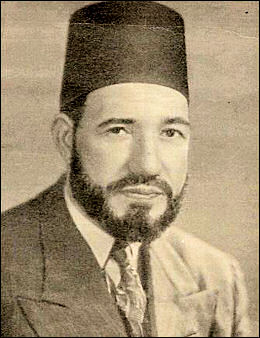
Hassan al-Banna The Muslim Brotherhood was founded in Banna’s house in the Egyptian city of Ismailiyya when he was 22. Banna railed against the colonial powers' humiliation of Muslims, preached that governments should be ruled by sharia and demanded steadfast discipline and secrecy from its members. While the group claimed to be interested only it peaceful evangelizing it’s militant wing, known as the “al-nizam al-khas” — the Special Apparatus, bore an uncanny resemblance to Mussolini’s brown shirts.
John L. Esposito wrote in the “Worldmark Encyclopedia of Religious Practices”: Hasan al-Banna, a schoolteacher, was born in a small town outside Cairo. His early traditional religious education was supplemented by his father, who had studied at Al-Azhar University during the time of Muhammad Abduh. After studying at a local teachertraining college, al-Banna went to Cairo to study at Dar al-Ulum College, with its modern curriculum. There he came into contact with disciples of Abduh and with the reformist thought of Abduh and Al-Afghani. After completing his studies, al-Banna took a teaching position at a primary school in Ismailia. Convinced that only through a return to Islam could the Muslim community revitalize itself and its fortunes and throw off European colonial domination, he ran discussion groups and, in 1928, established the Muslim Brotherhood (Ikhwan al-Muslimin). [Source: John L. Esposito “Worldmark Encyclopedia of Religious Practices”, 2000s, Encyclopedia.com]
Al-Banna believed that Muslim societies were dominated by, and dependent on, the West, both politically and culturally. He advocated an "Islamic alternative" to conservative religious leaders and modern Western secular-oriented elites. The ulama were generally regarded as passé, a religious class whose fossilized Islam and co-option by governments were major causes for the backwardness of the Islamic community. Modernists were seen as having traded away the very soul of Muslim society out of their blind admiration for the West.
Early History of Muslim Brotherhood
The Muslim Brotherhood was founded in Egypt in 1928 in the wake of Mustfa Kemal Ataturk’s secularization of Turkey and his abolition of the caliphate, the long line of Muslim rulers who traced its origin to the Prophet Mohammed. Known formally as the Society of Muslim Brothers, the brotherhood was a Muslim revival movement that spread from Egypt throughout the Arab world. It condemned perceived Western decadence and called for a return to traditional Muslim values and the establishment of an Islamic state, using military force if necessary.
In its early years the Muslim Brotherhood closed down bookstores and other havens of free thought. It trained its followers in the rituals of prayer and Koranic living. It also open schools and clinics, founded scout movement for children, and set up institutes to help people train for civil service exams. The organization even built factories and set up health insurances systems based on Islamic principals. By the 1930s it was strong political force. By the mid 1940s it had millions of members .
The Muslim Brothers were known as Ikhwanis. They tried at first to work within the existing framework of the state and attract members from a large spectrum. These members were expected to live in accordance with Muslim law. The group won many supporters but its inability to align with either the establishment or the left earned it hostility from both sides.
Muslim Brotherhood, Nasser and Egypt’s Struggle for Independence
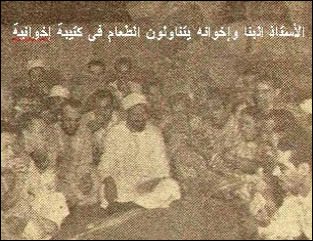
Brotherhood meeting with Banna During the 1940s, when Egypt fought to free itself from British colonial rule, some members of the Muslim Brotherhood engaged in terrorism and armed struggle that included bombings and assassinations. The party was technically banned in 1948, Soon after that a Muslim Brotherhood member assassinated Egypt’s prime minister. Al-Banna denounced the killing but was himself murdered by government security agents in 1949.
In the 1950s the Muslim Brotherhood helped people in Egypt and Syria to fight their colonial oppressors. After the forced abdication of Egypt’s King Farouk in 1952 the Muslim Brotherhood allied itself with Gamal Nasser, who became the leader of Egypt Lawrence Wright wrote in The New Yorker: “The Muslim Brothers...instigated an uprising against the British, whose lingering occupation of the Suez Canal zone enraged the nationalists. In January, 1952, in response to the British massacre of fifty Egyptian policemen, mobs organized by the Muslim Brothers in Cairo set fire to movie theatres, casinos, department stores, night clubs, and automobile showrooms, which, in their view, represented an Egypt that had tied its future to the West. At least thirty people were killed, seven hundred and fifty buildings were destroyed, and twelve thousand people were made homeless. The dream of a cosmopolitan metropolis ended, and the foreign community began to leave. [Source: Lawrence Wright, The New Yorker, September 16, 2002]
In July of that year, a military junta, dominated by an Army colonel, Gamal Abdel Nasser, packed King Farouk onto his yacht and seized control of the government, without firing a shot. According to several fellow-conspirators who later wrote about the event, Nasser secretly promised the Brothers that he would impose Sharia — the rule of Islamic law — on the country.
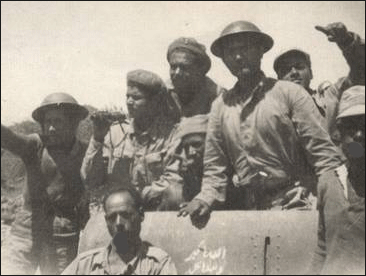
Ikhwanis A power struggle developed immediately between the leaders of the revolution, who had the Army behind them, and the Muslim Brothers, who had a large presence in the mosques. Neither faction had the popular authority to rule, but, as Nasser imposed martial law and eliminated political parties, the contest narrowed to a choice between a military society and a religious one, either of which would have been rejected by the majority of Egyptians, had they been allowed to decide.
Disagreements between Nasser and the Muslim Brotherhood soon led to a falling out. Nasser was a secularist and leftist with links to the Soviet Union. He opposed to Islamic fundamentalism. The Muslim Brotherhood opposed Nasser and his Arab nationalist agenda and took up arms against him. Thousands of members were sent to concentration camps often for doing little more than distributing leaflets. Some were executed.
In 1954, after Brotherhood members fired shots at Nasser, the Egyptian leader cracked won hard. Thousands of Ikhwanis were imprisoned, shattering the organization. Hundreds more were jailed in Syria and Iraq. Another Brotherhood leader, Sayyid Qutb, who advocated militant jihad against nonbelievers and revolution against impure Muslim states, became power and influential in the group. He was hanged by Egypt in 1966. Qutb's books would later provide the philosophical underpinning for jihadists such as bin Laden as well as many Islamists in this country. See Below
Muslim Brotherhood Moves Beyond Egypt
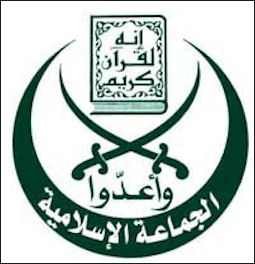
Jamaa Islamiya Lebanon John Mintz and Douglas Farah wrote in the Washington Post: “In the 1950s, Brotherhood activists — reeling from their suppression in Egypt, Iraq and Syria — found a refuge in Saudi Arabia, newly awash in oil money. Thousands of Ikhwanis became teachers, lawyers and engineers there, staffing government agencies, establishing Saudi universities and banks, and rewriting curricula. With royal family approval, Brotherhood activists also launched the largest Saudi charities, including the Muslim World League in 1963 and the World Assembly of Muslim Youth in 1973. Funded by petro dollars, they became global missionaries spreading the Saudis' austere and rigid Wahhabi school of Islam, whose adherents at times describe all non-Wahhabis as infidels. [Source: John Mintz and Douglas Farah, Washington Post, September 11, 2004]
“The missionary work morphed into armed struggle in Afghanistan, where in the 1980s Saudi-financed Brotherhood activists helped repel the Soviet invasion, with support from the CIA and Pakistan. As Islamic radicalism spread with the Soviet defeat in Afghanistan in 1989, many Ikhwanis laboring for the Saudis embraced worldwide jihad and were at al Qaeda's inception.
“In the 1960s, Brotherhood activists started arriving in the United States. Most embraced modernism and American culture, people who sympathize with them said. Many also ended a formal tie to the Cairo-based Ikhwan headquarters even as they hewed to Ikhwan principles. Among their main goals were carving out havens for Muslims, propagating Islam in America and backing Israel's destruction, said Ali Ahmed, a Saudi activist in Washington close to many Ikhwanis. "In this country the Ikhwan is mostly not a formal membership organization but a set of ideas people subscribe to," Ahmed said. "A lot of Brotherhood people who came here became more moderate and interested in democracy, while others became more radical."
Sayyid Qutb
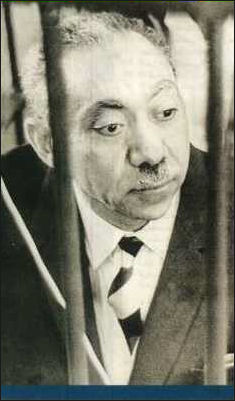
Sayyid Qutb Sayyid Qutb (1906-66) is regarded as the guiding light of the Muslim Brotherhood and the most eloquent spokesman for its views. A frail man, he was novelist, poet and critic who started out as supporter of secularism but now is regarded as the true father of Islamic fundamentalist and modern Muslim extremism. He is quite famous in the Arab world and his books were bestsellers. “Milestones”, also known as “Signposts Along the Road”, has been inspirations to many Islamists.
Lawrence Wright wrote in The New Yorker: “Qutb was a well-known literary critic in Cairo. Early in his career he was a secular writer who enjoyed a sinecure in the Ministry of Education. One of his early discoveries was a young writer named Naguib Mahfouz, who won the 1988 Nobel Prize in Literature. "Qutb was our friend," Mahfouz recalled recently in Cairo. "When I was growing up, he was the first critic to recognize me." Mahfouz told me that before Qutb went to America he was at odds with many of the sheikhs, who he thought were "out of date." According to Mahfouz, Qutb saw himself as part of the modern age, and he wore his religion lightly. His great passion was Egyptian nationalism, and, perhaps because of his strident opposition to the British occupation, the Ministry of Education decided that he would be safer in America. [Source: Lawrence Wright, The New Yorker, September 16, 2002]
One of Qutb’s friends was Mahfouz Azzam, the uncle of current Al-Qaida Aymen al-Zawahiri. Azzam knew Qutb nearly all his life. "Sayyid Qutb was my teacher," he told The New Yorker: "He taught me Arabic in 1936 and 1937. He came daily to our house. He held seminars and gave us books for discussion. The first book he asked me to write a report on was 'What Did the World Lose with the Decline of the Muslims?' "
Sayyid Qutb in the United States
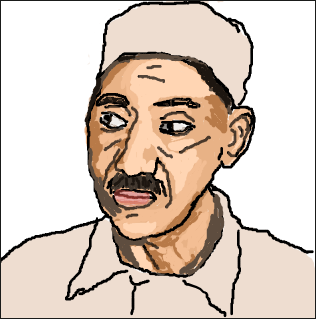
sketch of Sayyid Qutb Qutb visited the United States between 1948 and 1950, spending much of his time in Greely, Colorado, where he attended Colorado State College of Education. He was shocked by the decadence he saw there in the Truman, pre-Leave-It-To-Beaver era. Although he was in his 40s at the time he was taken aback like a naive schoolboy. He described “drunken, semi naked” women knocking at his door and a world of evil and temptation. He described an Esther William swimming pool movie as a frenzied dance where “arms circled arms, lips met lips, chest met chests, and the atmosphere was full of love.” The experience transformed him from a devout Muslim into a champion of jihad against the West.
Robert Wright, author of a book about Al-Qaida, told the Wall Street Journal, “Instead of becoming liberalized by his experience in America, he returned even more radicalized. Wright wrote in The New Yorker: “Qutb had studied American literature and popular culture; the United States, in contrast with the European powers, seemed to him and other Egyptian nationalists to be a friendly neutral power and a democratic ideal. In Colorado, however, Qutb encountered a postwar America unlike the one he had found in books and seen in Hollywood films. [Source: Lawrence Wright, The New Yorker, September 16, 2002]
"It is astonishing to realize, despite his advanced education and his perfectionism, how primitive the American really is in his views on life," Qutb wrote upon his return to Egypt. "His behavior reminds us of the era of the caveman. He is primitive in the way he lusts after power, ignoring ideals and manners and principles." Qutb was impressed by the number of churches in America — there were more than twenty in Greeley alone — and yet the Americans he met seemed completely uninterested in spiritual matters. He was appalled to witness a dance in a church recreation hall, during which the minister, setting the mood for the couples, dimmed the lights and played "Baby, It's Cold Outside." "It is difficult to differentiate between a church and any other place that is set up for entertainment, or what they call in their language, 'fun,' " he wrote. The American was primitive in his art as well. "Jazz is his preferred music, and it is created by Negroes to satisfy their love of noise and to whet their sexual desires," he concluded. He even complained about his haircuts: "Whenever I go to a barber I return home and redo my hair with my own hands."
Nasser and Sayyid Qutb
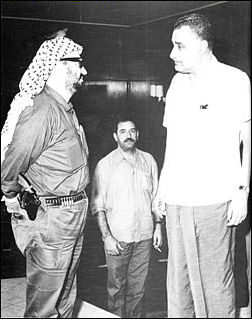
Nasser with Arafat Lawrence Wright wrote in The New Yorker: “Qutb returned to Egypt a radically changed man. In what he saw as the spiritual wasteland of America, he re-created himself as a militant Muslim, and he came back to Egypt with the vision of an Islam that would throw off the vulgar influences of the West. Islamic society had to be purified, and the only mechanism powerful enough to cleanse it was the ancient and bloody instrument of jihad. [Source: Lawrence Wright, The New Yorker, September 16, 2002]
“Qutb joined the Muslim Brotherhood in 1952...Nasser was pleased when Qutb, who had been one of his closest advisers and chief political ideologues, became the head of the Muslim Brothers' magazine, Al-Ikwan al-Muslimoun. Presumably, he hoped that Qutb would enhance his standing with the Islamists and keep them from turning against the socialist and increasingly secular aims of the new government.
“It quickly became obvious to Nasser that Qutb and his corps of young Islamists had a different agenda for Egyptian society from his, and he shut down the magazine after only a few issues had been published. But the religious faction was not so easily controlled. The ideological war over Egypt's future reached a climax on the night of October 26, 1954, when a member of the Brothers attempted to assassinate Nasser as he spoke before an immense crowd in Alexandria. Eight shots missed their mark. Nasser responded by having six conspirators executed immediately and arresting more than a thousand others, including Qutb. He had crushed the Brothers, once and for all, he thought.
Qutb was imprisoned, tortured and sent to a concentration camp in 1956. After wards he became anti-Nasser. He rejected Nasser’s Arab nationalism and called him un-Islamic. He believed that nationalism divided the Muslim world into nations and weakened it. In prison he began writing materials which called for the waging of jihad against the West, which Qutb said was the home of pagan barbarianism.
Sayyid Qutb’s Views
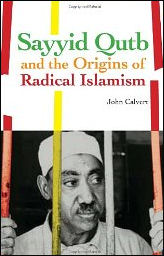 Lawrence Wright wrote in The New Yorker: “The hardening of Qutb's views can be traced in his prison writings. Through friends, he managed to smuggle out, bit by bit, a manifesto entitled "Ma'alim fi al-Tariq" ("Milestones"). The manuscript circulated underground for years. It was finally published in Cairo in 1964, and was quickly banned; anyone caught with a copy could be charged with sedition. Qutb begins, "Mankind today is on the brink of a precipice. Humanity is threatened not only by nuclear annihilation but by the absence of values. The West has lost its vitality, and Marxism has failed. At this crucial and bewildering juncture, the turn of Islam and the Muslim community has arrived."[Source: Lawrence Wright, The New Yorker, September 16, 2002]
Lawrence Wright wrote in The New Yorker: “The hardening of Qutb's views can be traced in his prison writings. Through friends, he managed to smuggle out, bit by bit, a manifesto entitled "Ma'alim fi al-Tariq" ("Milestones"). The manuscript circulated underground for years. It was finally published in Cairo in 1964, and was quickly banned; anyone caught with a copy could be charged with sedition. Qutb begins, "Mankind today is on the brink of a precipice. Humanity is threatened not only by nuclear annihilation but by the absence of values. The West has lost its vitality, and Marxism has failed. At this crucial and bewildering juncture, the turn of Islam and the Muslim community has arrived."[Source: Lawrence Wright, The New Yorker, September 16, 2002]
“Milestones” raised the importance of the militant side of the Islamic struggle, rejecting Al-Banna’s emphasis on teaching and setting a moral example. In the book Qutb declared that establishing sharia was a primary goal, and said Islamists that failed to do this were apostates and no better than infidels themselves.
Peter Bergen wrote in the Wall Street Journal: “”Milestones” became a primer for jihadist movements around the Muslim world. Qutb insisted that jihad be conducted offensively against the enemies of Islam. What was revolutionary was his insistence that Islam's enemies included Muslim governments that did not implement true sharia law... Qutb wanted secular Middle Eastern governments excommunicated from the Muslim community. That process of declaring other Muslims to be apostates is known as takfir. It would become a key al Qaeda doctrine.
In “Social Justice in Islam”, Qutb argued that there was no difference between life and religion: that every act was an act of worship. He also argued that men and women were equal spiritually but they had different roles and duties on earth. He also said it that was the responsibility of rulers in Islamic nations to uphold Islamic law and failure to do so was reason enough for the Muslim community to rebel.
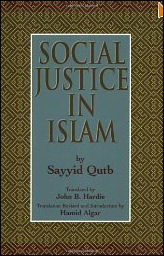 Qutb called for a “new Koranic generation” to build a new Muslim community. He envisioned a utopian Muslim world based on strict interpretation of the Koran and Islamic law and pushed forward the belief that a paradise with voluptuous virgins and fully ripened fruit waited the truly faithful in heaven. Qutb called on Muslims to embrace jihad. He said the “The western age is finished.” He described the leaders in most Muslim nations as corrupted by the West and materialism and demanded that they be replaced by a new generation of responsible and moral leaders. He envisioned an Islamic revolution that paralleled the rise of Mohammed and its victory over the Western world created by the Romans and Byzantines.
Qutb called for a “new Koranic generation” to build a new Muslim community. He envisioned a utopian Muslim world based on strict interpretation of the Koran and Islamic law and pushed forward the belief that a paradise with voluptuous virgins and fully ripened fruit waited the truly faithful in heaven. Qutb called on Muslims to embrace jihad. He said the “The western age is finished.” He described the leaders in most Muslim nations as corrupted by the West and materialism and demanded that they be replaced by a new generation of responsible and moral leaders. He envisioned an Islamic revolution that paralleled the rise of Mohammed and its victory over the Western world created by the Romans and Byzantines.
Wright wrote in The New Yorker: “Qutb divides the world into two camps — Islam and Jahiliyya. The latter, in traditional Islamic discourse, refers to a period of ignorance that existed throughout the world before the Prophet Muhammad began receiving his divine revelations, in the seventh century. For Qutb, the entire modern world, including so-called Muslim societies, is Jahiliyya. This was his most revolutionary statement — one that placed nominally Islamic governments in the crosshairs of jihad. "The Muslim community has long ago vanished from existence," he contends. "It is crushed under the weight of those false laws and customs which are not even remotely related to Islamic teachings." Humanity cannot be saved unless Muslims recapture the glory of their earliest and purest expression. "We need to initiate the movement of Islamic revival in some Muslim country," he writes, in order to fashion an example that will eventually lead Islam to its destiny of world dominion. "There should be a vanguard which sets out with this determination and then keeps walking on the path." [Source: Lawrence Wright, The New Yorker, September 16, 2002]
Sayyid Qutb, the Martyr
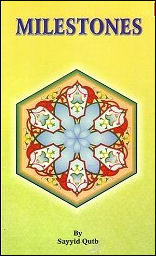 Qutb’s writings were considered calls for revolution. He was arrested, sentenced to death and hanged in 1966 for plotting against Nasser’s government. Lawrence Wright wrote in The New Yorker: “Stories about Sayyid Qutb's suffering in prison have formed a kind of Passion play for Islamic fundamentalists. Qutb had a high fever when he was arrested, but the state-security officers handcuffed him and took him to prison. He fainted several times on the way. For several hours, he was kept in a cell with vicious dogs, and then, during long periods of interrogation, he was beaten. His trial was overseen by three judges, one of whom was a future President of Egypt, Anwar al-Sadat. In the courtroom, Qutb ripped off his shirt to display the marks of torture. The judges sentenced him to life in prison but, when Qutb's health deteriorated further, reduced that to fifteen years. [Source: Lawrence Wright, The New Yorker, September 16, 2002]
Qutb’s writings were considered calls for revolution. He was arrested, sentenced to death and hanged in 1966 for plotting against Nasser’s government. Lawrence Wright wrote in The New Yorker: “Stories about Sayyid Qutb's suffering in prison have formed a kind of Passion play for Islamic fundamentalists. Qutb had a high fever when he was arrested, but the state-security officers handcuffed him and took him to prison. He fainted several times on the way. For several hours, he was kept in a cell with vicious dogs, and then, during long periods of interrogation, he was beaten. His trial was overseen by three judges, one of whom was a future President of Egypt, Anwar al-Sadat. In the courtroom, Qutb ripped off his shirt to display the marks of torture. The judges sentenced him to life in prison but, when Qutb's health deteriorated further, reduced that to fifteen years. [Source: Lawrence Wright, The New Yorker, September 16, 2002]
Qutb “suffered chronic bouts of angina, and it is likely that he contracted tuberculosis in the prison hospital.One line of thinking proposes that America's tragedy on September 11th was born in the prisons of Egypt. Human-rights advocates in Cairo argue that torture created an appetite for revenge, first in Sayyid Qutb and later in his acolytes, including Ayman al-Zawahiri. The main target of their wrath was the secular Egyptian government, but a powerful current of anger was directed toward the West, which they saw as an enabling force behind the repressive regime. They held the West responsible for corrupting and humiliating Islamic society. Indeed, the theme of humiliation, which is the essence of torture, is important to understanding the Islamists' rage against the West. Egypt's prisons became a factory for producing militants whose need for retribution — they called it "justice" — was all-consuming.
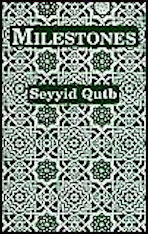 “In 1964, President Abd al-Salaam Arif of Iraq prevailed upon Nasser to grant Qutb parole, but the following year he was arrested again and charged with conspiracy to overthrow the government. The prosecutors built their case primarily on inflammatory passages in "Milestones," but they also cited evidence that Qutb and the Muslim Brothers were planning to assassinate various public figures. "It was a revolutionary court, with no defense," Mahfouz Azzam, who was Qutb's lawyer, told me. Qutb received a death sentence. "Thank God," he said. "I performed jihad for fifteen years until I earned this martyrdom." Qutb was hanged on August 29, 1966, and the Islamist threat in Egypt seemed to have been extinguished.
“In 1964, President Abd al-Salaam Arif of Iraq prevailed upon Nasser to grant Qutb parole, but the following year he was arrested again and charged with conspiracy to overthrow the government. The prosecutors built their case primarily on inflammatory passages in "Milestones," but they also cited evidence that Qutb and the Muslim Brothers were planning to assassinate various public figures. "It was a revolutionary court, with no defense," Mahfouz Azzam, who was Qutb's lawyer, told me. Qutb received a death sentence. "Thank God," he said. "I performed jihad for fifteen years until I earned this martyrdom." Qutb was hanged on August 29, 1966, and the Islamist threat in Egypt seemed to have been extinguished.
After that Qutb became a martyr throughout the Middle East. Among those that were inspired by him were the Islamists that carried out the murder of Anwar Sadat in 1981 — including...Zawahiri. Osama bin Laden was also deeply influenced by Qutb’s work, and regularly attended lectures given by Qutb’s young brother Muhammad. “Milestone” is now regarded as founding manifesto of jihadism.
Re-Emergence of the Muslim Brotherhood as a Political Force
In the 1970s two former Egyptian Brotherhood members started jihad groups: Blind sheik Omar Abdel Rahman, founder of the Islamic Group, which in the 1990s killed hundreds of civilians, including tourists, in Egypt and was involved in the 1993 World Trade Center bombing; and Ayman al-Zawahiri, founder of Islamic Jihad and current leader of Al-Qaida.

Islam Is The Solution In 1982, Syria’s dictator, Hafez al-Assad decided that the Brotherhood posed a threat to his authority, and his troops slaughtered as many as 30,000 people in the city of Hama, one of the group’s strongholds. In 1987 Hamas was created by the Brotherhood in the Palestinian territories. In 1989 a Brotherhood faction in Sudan led by Hasan Turabi helped overthrow the elected government there, with the goal of creating an Islamic state. The faction was involved in launching a war against non-Muslims in southern Sudan, where government security forces targeted civilians and engaged in ethnic cleansing, according to human rights groups. Turabi hosted Osama bin Laden in Sudan from 1991 to 1996.
The Brotherhood began to fall out of favor with the Saudis in 1990, when the Ikhwan backed Iraqi leader Saddam Hussein in his invasion of Kuwait. The Saudis slowly cut off funding. After the Sept. 11 attacks, Saudi leaders began describing the transnational Brotherhood as the germ of al Qaeda while playing down the role of its government-backed clergy. Recently, Saudi Interior Minister Prince Nayef repeatedly denounced the Brotherhood, saying it is guilty of "betrayal of pledges and ingratitude" and is "the source of all problems in the Islamic world."
Today the Muslim Brotherhood has branches and representatives throughout the Muslim world. Parties like the Palestinian’s Hamas and Jordan’s Islamic Action Front were inspired by and share the same ideology as the Muslim Brotherhood. Despite its power, international influence and deep roots the Muslim Brotherhood has no central decision-making organ and has taken many forms depending in its location. In Sudan, it has aligned itself with the ruling party. In Jordan and Morocco it is regarded as a moderate force. It more militant ambitions are best represented in Hamas.
Among the most influential figures in the Muslim Brotherhood today are Seif al-Islam, the son of Hassan al-Banna, and Ibrahim Hudaybi, whose grandfather Husan replaced al-Banna as the Muslim Brotherhood’s supreme guide and wrote an influenced book in prison called “Preachers, Not Judges”, that highlight the group’s commitment too peace.
Muslim Brotherhood in Egypt
Egypt's Mohammed Morsi In Egypt the Muslim Brotherhood party was technically banned in 1948 but was tolerated for decades. It reemerged after being dormant for many years with outrage with Sadat over the Camp David agreement in 1981. By the 1990s the Muslim Brotherhood was operating semi-openly in Egypt, with some members serving in parliament. The group said it eschewed violence against the government of Hosni Mubarak, arguing that it could attain its goals by peaceful proselytizing, one wayward soul at a time. Still, Mubarak banned the Brotherhood, labeling it a terrorist front, and jailed hundreds.
Egypt remains the Brotherhood's center of gravity, with Mohammed Akef, its "Supreme Guide" in that country, considered by many to be the group's de facto leader worldwide. According to the Washington Post “Akef embodies the contradictions of the movement, with statements supporting democratic elections as well as violence against Americans in Iraq.
Under Mubarak candidates who had ties with the Muslim Brotherhood ran as independents. The Labor Party is sometimes allied with the Muslim Brotherhood. Muslim Brotherhood members that ran as independents were often elected. In one election 40 members of the Muslim Brotherhood running as independents were elected.
In presidential elections in 1999, members the Muslim Brotherhood were prevented from entering polling stations. In 2005, Muslim Brotherhood candidates were allowed to run as independents and won 20 percent of the seats, making them the largest opposition bloc in Egypt. It is widely believed that, in the Mubarak era, if the Muslim Brotherhood was allowed to organize as a party and its members could run in elections it would have taken power in Egypt.
Muslim Brotherhood Beliefs and Strategy

Muslim Brotherhood in Morocco Qutb and Hassan al-Banna are regarded as the founders of modern Islamist thought and jihadist action. Borrowing elements of European fascist ideology, they backed expensive social welfare programs while pushing the idea of an Islamic state governed by Sharia law. Although the Muslim Brotherhood says it opposed to violence it is still considered by some to be a terrorist front.
The Muslim Brotherhood rejects Western “evils” and calls for the creation of a pan-Islamic religious state. For some the ultimate goal is to create a transitional community of believers, an Islamic empire united under a modern caliphate. Although it doesn’t push the point to vocally it opposes Israel’s right to exist.
The Muslim Brotherhood strategy is to advance “the struggle” by establishing Islamic theocracies through infiltration of social structures, subsidizing services, and controlling mosques and using them as political pulpits. The group once espoused violence as a vehicle of change but has renounced that strategy since the 1970s. It says its goal is to create an Islamic state through peaceful means. The Muslim Brotherhood has called for democratic reforms throughout the Middle East.
James Traub wrote in the New York Times Magazine, “Since its founding in 1928, the brotherhood has sunk deep roots in the...urban working and middle classes, and especially the professions, establishing a powerful base in the “syndicates” that represent doctors, lawyers, journalists, and others.”
Muslim Brotherhood and Sharia
Lorenzo Vidino wrote in the Washington Post, “All Brotherhood factions will now push to increase the influence of sharia - Islamic law - in Egypt. However, the generational battle will determine what vision of sharia they will pursue. [Source: Lorenzo Vidino, Washington Post, March 4, 2011 ^\^]
“The old guard's motto is still "the Qur’an is our constitution." The second generation speaks of human rights and compares itself to Europe's Christian Democrats - embracing democracy but keeping a religious identity. The third generation, especially in urban areas, seems to endorse this approach, even if skeptics contend that younger militants are simply offering a moderate facade to the West. ^\^
“So far, the old guard is prevailing. The Brotherhood's first major political platform, released in 2007, paid lip service to democracy and stated that women and non-Muslims could not occupy top government posts, and gave a body of unelected sharia experts veto power over new laws. How long this old guard remains in control will shape the group's positions on sharia's most debated aspects, from women's rights to religious freedoms.” ^\^
Muslim Brotherhood and Charity
The Muslim Brotherhood has been very effective providing social services. In Egypt it dominates about 14,000 private charities and 20 professional associations, including the medical, engineering and legal groups. This has given them legitimacy as potential administrators and rulers. In Egypt, the Mubarak government prevented the Muslim Brotherhood from providing earthquake relief. Laws forbidding people from accepting foreign donations without permission were established in 1992 to keep Islamic charities from providing assistance after a 1992 quake.
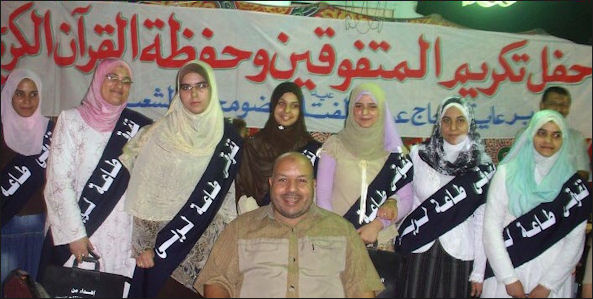
Muslim Brotherhood at Eid festival
John Mintz and Douglas Farah wrote in the Washington Post: “In the 1950s, Brotherhood activists...found a refuge in Saudi Arabia, newly awash in oil money. Thousands of Ikhwanis became teachers, lawyers and engineers there, staffing government agencies, establishing Saudi universities and banks, and rewriting curricula. With royal family approval, Brotherhood activists also launched the largest Saudi charities, including the Muslim World League in 1963 and the World Assembly of Muslim Youth in 1973. Funded by petro dollars, they became global missionaries spreading the Saudis' austere and rigid Wahhabi school of Islam, whose adherents at times describe all non-Wahhabis as infidels. In the 1980s, Youssef Nada created the Bank al Taqa and related firms with Brotherhood money. He begins a pivotal figure in spreading the Brotherhood around the globe. [Source: John Mintz and Douglas Farah, Washington Post, September 11, 2004]
“Nada, who was jailed in Egypt in the 1950s for Brotherhood activities, later became wealthy selling construction materials in Saudi Arabia, where he was called the "cement king," and now lives in a sprawling Italian villa. With "significant backing from the Muslim Brotherhood," Nada set up a complex global banking network in the 1980s, the Treasury Department said when it recently designated Nada and two other Brotherhood officials as terrorist financiers. U.S. and European officials say the network has funded al Qaeda, Hamas and Algeria's Armed Islamic Group -- assertions that Nada denies. Although the network was supposedly shut down, U.S. and European officials say they still find Nada moving funds under new corporate names. One of Nada's key aides has been a Holocaust revisionist from Switzerland, Ahmed Huber -- one of many neo-Nazis who helped the Ikhwan set up its financial structure.
Muslim Brotherhood and Terrorist Funding
John Mintz and Douglas Farah wrote in the Washington Post: “The architect of the Sept. 11 strikes, Khalid Sheik Mohammed, told U.S. interrogators that he was drawn to violent jihad after joining the Brotherhood in Kuwait at age 16 and attending its desert youth camps” according to the 9/11 Commission. “Brotherhood radicals in Germany and Spain are suspected of organizing logistical support for the al Qaeda cell that carried out the attacks. Western governments subsequently shut down a huge banking network in Switzerland, Liechtenstein and the Bahamas that was set up by a leading Brotherhood figure, citing its numerous financial ties to al Qaeda and other terrorists. The founder, Youssef Nada, denies wrongdoing. [Source: Washington Post , John Mintz and Douglas Farah, September 11, 2004]
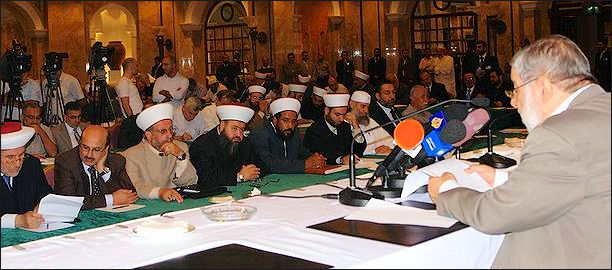
Muslim Brotherhood meeting
In March 2002, federal agents in Northern Virginia raided a cluster of Muslim think tanks, companies and foundations run mostly by men who sympathized with the Brotherhood in Iraq and elsewhere in the 1960s...In a 42-count indictment in July 2004, the U.S. government alleged that an Islamic charity, the Texas-based Holy Land Foundation for Relief and Development, funneled $12.4 million to a designated terrorist group, Hamas. The indictment said the Holy Land Foundation was "deeply involved with a network of Muslim Brotherhood organizations dedicated to furthering the Islamic fundamentalist agenda espoused by Hamas." The Holy Land Foundation denies wrongdoing.
The Brotherhood has been connected to many Islamic extremists worldwide. Two Egyptian Brotherhood members went on to found split-off terrorist groups: Ayman Zawahiri, now Osama bin Laden's deputy, and blind sheik Omar Abdel Rahman, who was convicted in 1995 of plotting to blow up New York landmarks.
Global Reach of the Muslim Brotherhood
Lorenzo Vidino wrote in the Washington Post, “Today, groups in more than 80 countries trace their ideologies to the Brotherhood, but these entities do not form a cohesive unit. Globally, the Brotherhood is more a school of thought than an official organization of card-carrying members. [Source: Lorenzo Vidino, Washington Post, March 4, 2011, Lorenzo Vidino, a visiting fellow at the Rand Corporation, is the author of "The New Muslim Brotherhood in the West."^\^]
“Attempts to create a more formal global structure have failed, and the movement instead has taken on various forms. Where it is tolerated, as in Jordan, it functions as a political party; where persecuted, as in Syria, it survives underground; and in the Palestinian territories, it took a peculiar turn and became Hamas. ^\^
“Though they interact through a network of personal, financial and ideological ties, Brotherhood entities operate independently, and each pursues its goals as it deems appropriate. What binds them is a deep belief in Islam as a way of life that, in the long term, they hope to turn into a political system, using different methods in different places.” ^\^
Muslim Brotherhood, Terrorism and Al-Qaida
Historically, the Muslim Brotherhood has had close ties to al-Qaeda but in recent years those ties have frayed. Lorenzo Vidino wrote in the Washington Post, “In the 1950s and 1960s, the Brotherhood was brutally repressed by the regime of Gamal Abdel Nasser. Understanding that violence against Nasser was a losing proposition, most of the group opted for nonviolent opposition, seeking to Islamize society through grass-roots education and mainstream politics. [Source: Lorenzo Vidino, Washington Post, March 4, 2011 ^\^]
“But a smaller wing, led by theologian Sayyid Qutb, opted for violence. This faction argued that Islamization from below was too slow and would be impeded by local and foreign powers. For generations, Qutb's idea of religiously justified violence has inspired jihadists worldwide. Several al-Qaeda leaders, including Osama bin Laden and Khalid Sheik Muhammad, were influenced by the Brotherhood early in life, only to grow disillusioned with the organization later on. ^\^
“While the Brotherhood has not completely rejected violence - supporting its use in Iraq, the Palestinian territories, Afghanistan and other places where it believes Muslims are under attack - the two groups have recently clashed over tactics and theology. Al-Qaeda's No. 2, Egyptian Ayman al-Zawahiri, even wrote a book attacking the group for replacing bullets with ballots.” ^\^
Image Sources: Wikimedia Commons, except Qutb books, Amazon
Text Sources: Internet Islamic History Sourcebook: sourcebooks.fordham.edu ; Arab News, Jeddah; “Islam, a Short History” by Karen Armstrong; “A History of the Arab Peoples” by Albert Hourani (Faber and Faber, 1991); “World Religions” edited by Geoffrey Parrinder (Facts on File Publications, New York); “Encyclopedia of the World’s Religions” edited by R.C. Zaehner (Barnes & Noble Books, 1959); Metropolitan Museum of Art, Encyclopedia.com, National Geographic, BBC, New York Times, Washington Post, Los Angeles Times, Smithsonian magazine, The Guardian, Al Jazeera, The New Yorker, Time, Newsweek, Reuters, Associated Press, AFP, Library of Congress and various books and other publications.
Last updated April 2024

